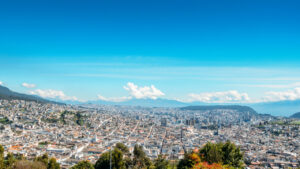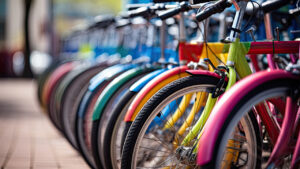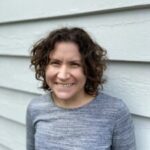Life-Affirming Cycling Practices in Quito, Ecuador
Julie Gamble, 2024-25 RPW Center Faculty Fellow. This year’s group is exploring the theme of Emerging Technologies in Human Context: Past, Present, and Future

Daisi held her right arm in the air with a closed fist, a common signal for cyclists to use when coming to a stop. We stopped at her request and had a quick conversation:
Daisi: This is one of the stops of the up-and-coming metro.
Julie: Yes, if I remember correctly, this is the place where we had the bike school.
Daisi: Yes, exactly. That’s awesome. This is also where Ungüi rests. You know. One of our mountains. In the center, there is the Panecillo (a hill). Here we have Ungüi. So, when I go on my outings, I ask the Panecillo for permission to pass and for it to protect me. And then, when I arrive in the south, I greet Ungüi [hahaha] because it is a mountain that I used to hike a lot when I was little with my parents. We would pray and say a few words requesting protection because it is an Apu that protects the South.
Julie: And what is an Apu? Is it a Kichwa word?
Daisi: It is a Kichwa word. It is like a kind of god. It is a sacred mountain. It is the great Apu of the south. Ungüi. It’s called Ungüi.
Julie: Great, well that’s awesome. I hope it protects us [on our journey]!
Now a friend, I met Daisi in 2014 when attending cycling events and activities held by Quito’s feminist cycling collective, Carishina en Bici (CEB, Kichwa for “bad housewives who cycle”). I have been a member of and followed CEB since 2012. After we exchanged the above dialogue during this outing, we continued on the route for another hour south in the city. Daisi is a woman in her late thirties who learned how to cycle through CEB’s bicycle school many years ago and has continued with the group as a leader, organizer, and activist.
cycling collective, Carishina en Bici (CEB, Kichwa for “bad housewives who cycle”). I have been a member of and followed CEB since 2012. After we exchanged the above dialogue during this outing, we continued on the route for another hour south in the city. Daisi is a woman in her late thirties who learned how to cycle through CEB’s bicycle school many years ago and has continued with the group as a leader, organizer, and activist.
This particular moment was unexpected, caught on the GoPro device that she had mounted to her bicycle as we cycled one of her normal trajectories from the center-northeast side of the city to the south, where she grew up with her parents in a lower-middle-class gated community. We were moving from north to south, traversing the urban landscape with mountains along the west and hills to the east. The city sits in a valley nestled between the mountains she references from our conversation.
A Go-Pro device is a video and photographic tool used for recreation to capture active moments like skiing, snorkeling, and skateboarding. Since the early 2000s, it has also been adapted for cycling research to uncover moments like the one I detail above. Inspired by the interdisciplinary field of mobilities studies, a GoPro device allows researchers to collect visual and geographic data on the move with interlocutors like Daisi. I find that GoPros are an excellent research tool because they gather GPS and visual data that can be converted into maps for spatial analysis. I find them a powerful device because, beyond the map, they can uncover subtle, minor acts like the one Daisi shared with me.
While on the move and the stops along the way, a GoPro has allowed me to rely on technology to uncover what life-affirming relationships urban residents like Daisi come to rely on within a fragmented, insecure city. Instead of looking out for police protection, she relies on a nurturing relationship she has cultivated with the city’s mountains to guide her way. Each time she cycles south, she performs a ritual on the streets to provide her comfort, care, and faith that she will make it home. Daisi’s traditional ceremony represents a slice of data that I have gathered during my decade of ethnographic research in Quito, Ecuador.
Such mobile ethnographic experiences also build up my current book project, tentatively titled Solidarity City: Urban Mobility and the Unfinished Politics of Buen Vivir, in Quito, Ecuador. In my research, I analyze urban mobility practices to draw insight into how people carve out spaces of belonging and build up a caring life in the city amidst contradictions such as expanded democratic rights, the rise of unemployment, and unequal and extensive urbanization on a warming planet.

Julie Gamble is an Assistant Professor of Gender and Sexuality Studies. She earned her PhD in City and Regional Planning from the University of California, Berkeley. Her current book project investigates urban mobility and the politics of solidarity in Quito, Ecuador. She is interested in how gender informs urban experience and how to build fairer cities. She teaches courses on gender, the city, urban mobilities, Latinx urban environments and sustainable urban development.